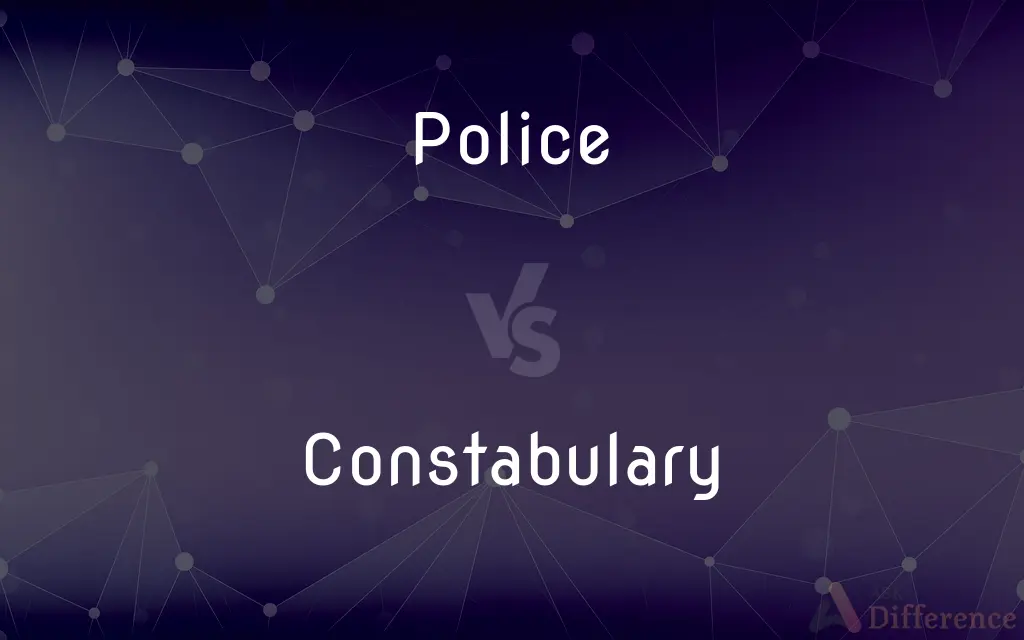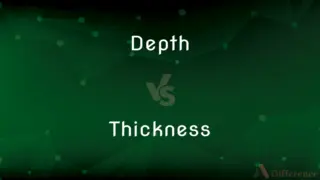Police vs. Constabulary — What's the Difference?
Edited by Tayyaba Rehman — By Maham Liaqat — Updated on March 22, 2024
Police are law enforcement officers representing a civil authority, while constabulary refers to a police force in a specific area, often rural.

Difference Between Police and Constabulary
Table of Contents
ADVERTISEMENT
Key Differences
The term "police" encompasses a broad range of law enforcement personnel who work under a civil authority to maintain public order, enforce laws, and prevent, detect, and investigate crimes. They operate within various levels of government, including local, state, and federal jurisdictions, depending on the country. On the other hand, "constabulary" typically refers to a police force that operates in certain geographical areas or jurisdictions, often with a focus on rural or less urbanized regions. The distinction between the two terms can vary by country, reflecting historical and administrative differences in law enforcement structures.
Police forces are organized with a hierarchical structure and may have specialized units for dealing with specific types of crimes, such as fraud, narcotics, or violent crimes. Their responsibilities are wide-ranging, from patrolling and traffic control to emergency response and crime investigation. Constabularies, while also part of the broader police organization, may be more community-oriented, with officers often having a closer relationship with the local population they serve. This can be particularly true in countries or regions where the term "constabulary" is used to describe the local police force.
In some countries, the term "constabulary" is synonymous with the national or local police service, such as in the United Kingdom, where police forces may be referred to as constabularies, emphasizing their statutory law enforcement duties. In other contexts, constabulary forces may function with specific mandates, such as guarding borders, managing rural crime, or providing security in certain jurisdictions.
The roles and powers of police and constabularies are generally defined by law, with both aimed at protecting citizens, maintaining public order, and ensuring the rule of law. However, the operational focus and community engagement strategies of constabularies might differ from those of larger police forces, reflecting their adaptation to local needs and conditions.
Despite the differences in focus and operational scope, both police and constabularies are integral to the law enforcement system, working towards the common goal of ensuring public safety and security. Their efforts are complementary, with each playing a crucial role in the comprehensive approach to law enforcement and community protection.
ADVERTISEMENT
Comparison Chart
Definition
Law enforcement officers under a civil authority
A police force operating in a specific area
Focus
Broad, including urban and rural areas
Often rural or specific jurisdictions
Organizational Structure
Hierarchical, with specialized units
May be more community-oriented
Responsibilities
Wide-ranging, from patrolling to crime investigation
May focus on local needs and community engagement
Example
NYPD, LAPD, FBI in the US
Lancashire Constabulary in the UK
Compare with Definitions
Police
Police operate under the jurisdiction of civil authorities to enforce legal norms and protect citizens.
As representatives of civil authority, the police played a crucial role in community safety.
Constabulary
A body of officers representing a police force in a specific geographical area, often with a focus on community engagement.
The local constabulary was commended for its efforts in reducing rural crime.
Police
A key responsibility of the police is to investigate crimes, gather evidence, and assist in prosecutions.
The police launched a thorough crime investigation following the bank robbery.
Constabulary
Constabularies adapt their strategies to meet the local needs and conditions of the areas they serve.
The constabulary developed a targeted approach to address the unique challenges of the community.
Police
Police have the authority to enforce laws within a specific geographical area or jurisdiction.
The jurisdiction of the local police extended over the entire city, ensuring law and order.
Constabulary
Constabularies often have a significant presence in rural areas, addressing specific safety and crime concerns.
The constabulary introduced new initiatives to tackle the rise in rural thefts.
Police
Many police forces have specialized units focused on specific types of crimes, such as cybercrime or narcotics.
The police department's specialized unit was instrumental in cracking down on the drug trafficking ring.
Constabulary
Many constabularies emphasize building strong relationships with the communities they serve.
The constabulary's community-oriented policing strategy helped improve public trust.
Police
Law enforcement personnel responsible for maintaining public order, enforcing laws, and preventing, detecting, and investigating crimes.
The police responded quickly to the emergency call, securing the area.
Constabulary
Constabularies may operate within defined jurisdictions, focusing on local law enforcement needs.
The constabulary had jurisdiction over several small towns and villages.
Police
The police are a constituted body of persons empowered by a state, with the aim to enforce the law, to ensure the safety, health and possessions of citizens, and to prevent crime and civil disorder. Their lawful powers include arrest and the use of force legitimized by the state via the monopoly on violence.
Constabulary
Constabulary may have several definitions: A civil, non-paramilitary (police) force consisting of police officers called constables. This is the usual definition in the United Kingdom, in which all county police forces once bore the title (and some still do).
Police
A body of government employees trained in methods of law enforcement and crime prevention and detection and authorized to maintain the peace, safety, and order of the community.
Constabulary
The body of constables of a district or city.
Police
A body of persons with a similar organization and function
Campus police. Also called police force.
Constabulary
The district under the jurisdiction of a constable.
Police
(Archaic) Regulation and control of the affairs of a community, especially with respect to maintenance of order, law, health, morals, safety, and other matters affecting the public welfare.
Constabulary
An armed police force organized like a military unit.
Police
(Informal) A group that admonishes, cautions, or reminds
Grammar police.
Fashion police.
Constabulary
Of or relating to constables, constabularies, or their jurisdictions.
Police
The cleaning of a military base or other military area
Police of the barracks must be completed before inspection.
Constabulary
Of or relating to constables.
Police
The soldiers assigned to a specified maintenance duty.
Constabulary
Characteristic of police; police-like, rather than military.
Constabulary missions are different from fighting wars.
Police
To regulate, control, or keep in order with a law enforcement agency or other official group.
Constabulary
A police force.
Police
To impose one's viewpoint or beliefs regarding, especially in an authoritarian way
Policing others' comments by implementing speech codes.
Constabulary
The police in a particular district or area.
Police
To critique in a presumptuous or arrogant manner
Policed the grammar of everyone who commented on the blog post.
Constabulary
Of or pertaining to constables; consisting of constables.
Police
To make (a military area, for example) neat in appearance
Policed the barracks.
Constabulary
The collective body of constables in any town, district, or country.
Police
A public agency charged with enforcing laws and maintaining public order, usually being granted special privileges to do so, particularly
Call the police!
Constabulary
The force of policemen and officers;
The law came looking for him
Police
A department of local (usually municipal) government responsible for general law enforcement.
The Sheriff's Department has jurisdiction across most of Chicago but focuses on the unincorporated area and tasks like prisoner transport, leaving the rest to the Chicago Police Department.
Police
(UK) A branch of the Home Office responsible for general law enforcement within a specific territory.
Police
Any of the formally enacted law enforcement agencies at various levels of government.
Police
The staff of such a department or agency, particularly its officers; an individual police officer.
Police
People who try to enforce norms or standards as if granted authority similar to the police.
Who called the fashion police?
Police
Cleanup of a military facility, as a formal duty.
Police
Synonym of administration, the regulation of a community or society.
Police
(obsolete) policy.
Police
(obsolete) polity, civilization, a regulated community.
Police
(transitive) To enforce the law and keep order among (a group).
Extra security was hired to police the crowd at the big game.
Police
To clean up an area.
Police
To enforce norms or standards upon.
To police a person's identity
Police
A judicial and executive system, for the government of a city, town, or district, for the preservation of rights, order, cleanliness, health, etc., and for the enforcement of the laws and prevention of crime; the administration of the laws and regulations of a city, incorporated town, or borough.
Police
That which concerns the order of the community; the internal regulation of a state.
Police
The organized body of civil officers in a city, town, or district, whose particular duties are the preservation of good order, the prevention and detection of crime, and the enforcement of the laws.
Police
Military police, the body of soldiers detailed to preserve civil order and attend to sanitary arrangements in a camp or garrison.
Police
The cleaning of a camp or garrison, or the state a camp as to cleanliness.
Police
To keep in order by police.
Police
To make clean; as, to police a camp.
Police
The force of policemen and officers;
The law came looking for him
Police
Maintain the security of by carrying out a control
Common Curiosities
Can the term "constabulary" refer to an entire national police force?
Yes, in some countries, the national police force may be referred to as a constabulary, especially in the UK and some Commonwealth countries.
Do police and constabularies have different legal powers?
Their legal powers are generally defined by national or local laws and can be similar, but operational practices and focus areas may differ.
Are constabularies always focused on rural areas?
While constabularies often focus on rural or specific jurisdictions, their scope and responsibilities can vary, including urban duties in some cases.
How does community-oriented policing differ between police and constabularies?
While both can engage in community-oriented policing, constabularies may have a stronger emphasis on this approach, especially in rural or closely-knit communities, fostering closer relationships with residents.
What is the primary difference between police and constabulary?
The primary difference lies in their operational scope: police refer to law enforcement officers in a broad sense, while constabulary usually denotes a police force within a specific area, often with a rural or community focus.
What historical differences exist between police and constabulary forces?
Historically, constabulary forces often originated to address rural policing needs, while police forces were established in urban areas to manage a broader range of public order and safety issues.
Are constabulary forces smaller than police forces?
Constabulary forces can vary in size, but they are often smaller than major city police forces due to their focus on specific areas or communities.
Do police and constabularies use different equipment?
The equipment used can vary depending on the specific duties and geographic area of operation, but both police and constabularies utilize a range of law enforcement tools and technologies.
How do police and constabularies engage with the community to improve public safety?
Both engage with the community through outreach programs, public meetings, and educational initiatives to build trust, improve communication, and collaboratively address safety concerns.
How is the leadership structure different between police and constabularies?
While both have hierarchical leadership structures, the specific ranks and roles can vary, with constabularies sometimes having more localized command structures tailored to their community-focused operations.
What training is required for police vs. constabulary officers?
Training for both police and constabulary officers typically includes law enforcement techniques, legal education, and community relations, although specific programs can vary by country and force.
What roles do police and constabularies play in emergency situations?
In emergencies, both police and constabularies play crucial roles in response efforts, including securing areas, providing aid, managing evacuations, and coordinating with other emergency services.
How do police and constabularies address issues of diversity and inclusion within their ranks?
Many police and constabulary forces are actively working to improve diversity and inclusion through recruitment strategies, training programs, and community engagement efforts to better reflect and serve the communities they protect.
How do police and constabularies cooperate in law enforcement efforts?
Police and constabularies often cooperate through information sharing, joint operations, and support in areas such as crime investigation, emergency response, and public safety initiatives.
Can constabulary officers enforce laws outside their specific jurisdictions?
Officers generally enforce laws within their assigned jurisdictions, but there can be exceptions or agreements that allow for cross-jurisdictional enforcement under certain circumstances.
Share Your Discovery

Previous Comparison
Target vs. Goal
Next Comparison
Depth vs. ThicknessAuthor Spotlight
Written by
Maham LiaqatEdited by
Tayyaba RehmanTayyaba Rehman is a distinguished writer, currently serving as a primary contributor to askdifference.com. As a researcher in semantics and etymology, Tayyaba's passion for the complexity of languages and their distinctions has found a perfect home on the platform. Tayyaba delves into the intricacies of language, distinguishing between commonly confused words and phrases, thereby providing clarity for readers worldwide.















































